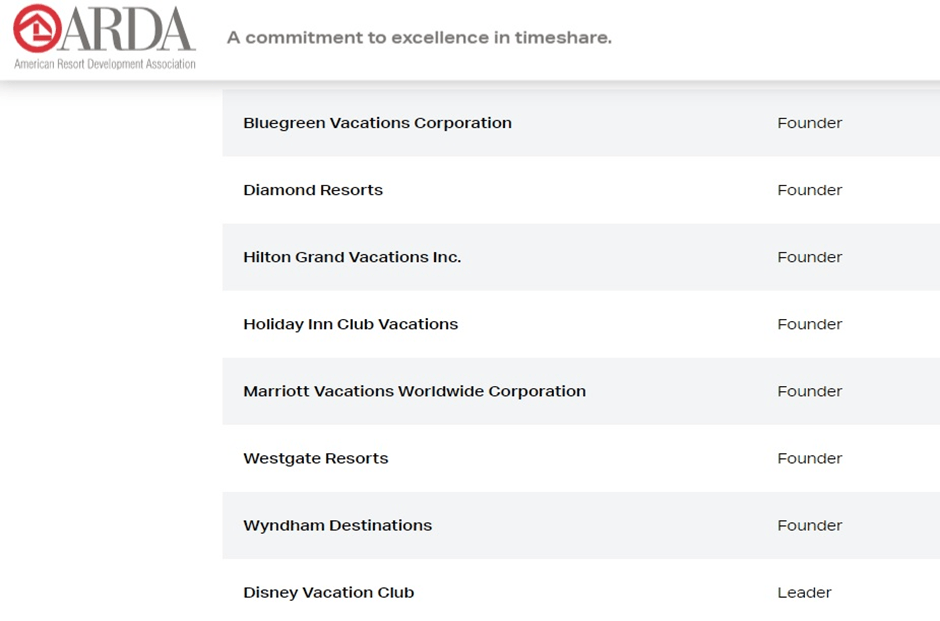Could be a score from a “soccer” match but it’s not, so what are we referring to? Let us explain. In the USA there is a powerful organisation known as the American Resort Development Association (ARDA). As the name suggests their raison d’être is to further the development of timeshare resorts and support the industry. Reading their membership list shows that all of the big players are members, below is a snapshot:

Naturally with such illustrious members it may be easily demonstrated that the ARDA allegiance is with the developer and not the ordinary timeshare owner, after all the fees paid by developers to be a member is the lifeblood of ARDA.
In a recent ARDA newsletter, President/CEO Jason Gamel gave the foreword and was excited by some news, we reproduce said news below:
“We were also able to celebrate a big victory in North Carolina with the passage of a new modern timeshare act that includes landmark protections for timeshare owners using timeshare exit services. This was a joint effort with the North Carolina Real Estate Commission who reached out to ARDA in the summer of 2019 for guidance. This successful partnership underscores the importance of ARDA’s regulatory outreach work.”
On the surface landmark protections in place for timeshare owners in North Carolina are all for the good but these protections are only aimed at timeshare exit companies and are completely void of any real legal help for owners who experience financial problems, illness or simply have had enough.

USA – The land of litigation
It’s fair to say that Diamond Resorts are at the fore of litigating against exit companies in the States. In most cases the accusation is one of Tortious Interference, put simply this is a common law claim that a defendant intentionally convinced or caused a third party to breach its contract with the plaintiff which resulted in damages to the plaintiff. In effect this means a third party exit company deliberately enticed a timeshare owner to break their contract with the developer. Ancillary to this the developer often states falsification of advertising as an additional complaint.
Whilst Diamond Resorts are leading the charge, other developers are not far behind. In a recent case Washington Attorney General Bob Ferguson announced that Kirkland-based timeshare exit company, Reed Hein & Associates LLC, trading as the Timeshare Exit Team, must stop its deceptive timeshare exit practices and pay a $2.61 million fine to Washington State. If the company violates the terms of the consent decree, it will be required to pay an additional $19 million — a total judgment of $22 million. Reed Hein also retracted and apologised for statements made in response to the Attorney General’s lawsuit.
Subsequent to this, Timeshare Exit Team seems to have gone out of business, no real surprise. Naturally ARDA had to make an issue of this.

Scam V Real
At TCA we would be the first to agree that scam companies must be eliminated and any action taken to achieve this must be applauded. That said, a question which has to be asked is why do exit companies even exist? The answer is both simple and clear, American developers either make it extremely difficult or nigh on impossible to escape timeshare ownership. This very problem has spawned a sub industry of exit companies, some for real and some fake.

From problem to solution
It could be argued that the timeshare developer industry has singularly created the problem. By their intransigence in accepting that life changes or other significant events and the fact that owners either need to, or simply want to relinquish their ownership but are unable to do so, the sub industry that is the exit company simply walked through a wide open door.
Our research shows that new timeshare sales in the USA, whilst slowing, are still buoyant so much so that developers are not suffering massive inventory stock they need to get rid of. Certain Disney resorts actually have a waiting list and in order to have spare inventory, Disney even offer an attractive buyback scheme. In compiling this article we spoke to a 25 year veteran of the timeshare exit industry and in all that time he has not once had to assist with a Disney exit.
If other developers took a leaf from the Disney book then the exit industry would disappear overnight. Instead of this developers would rather spend their corporate Dollar on litigation, working on the basis that if they can eliminate all the exit companies then its problem solved.

State legislation
Never bite the hand that feeds you! Timeshare employment and revenue streams plus the taxes derived from the same are all important to many states. Florida is probably the timeshare capital of the world. Florida is home to over 350 timeshare resorts; it doesn’t take a mathematician to guestimate how much income is generated for the state from these resorts.
Whilst it’s fair to say that Florida has enacted consumer protection law, much like Europe, the law really focuses on the point of sale and offers little legal comment to those trapped in an unwanted timeshare.
The more owners, the more annual maintenance fees, the more annual maintenance fees, the more profit for the developer, the more profit for the developer, the more tax revenue for the state.
Wyndham Hotels & Resorts have 312 properties throughout the state of Florida. In total they have 9,280 properties globally. According to their December 2020 end of year results their revenue was $1,300,000,000 (Wow that is some number). Using simple maths this could mean that the revenue from Florida resorts alone might be $43,706,000 or more think of the state corporation tax and staff income tax etc all payable for the benefit of Florida State, and here we simply look at one developer.

Driving exit companies out of business
As we stated earlier, Diamond Resorts seem to be the most aggressive developer when attacking the exit industry. This is obviously of concern to Diamond who have created their own website on the subject, Diamond Transitions. Quotes from the site such as the one below indicate that Diamond is confirming that not only will they not deal with third party exit companies they are trying to convince owners not to make contact:
“Participation with a timeshare exit or resale company or firm may negatively impact your ability to apply for Transitions”.
Put simply, Diamond is effectively saying if they won’t let you out of your contract then there is nowhere to turn for assistance; can this be either right or fair?
A well worn phrase comes to mind “people in glass houses shouldn’t throw stones”. Diamond are by no means whiter than white. According to an article placed on Wikipedia the following was quoted:

Mark Brnovich
“On December 23, 2016, Arizona Attorney General Mark Brnovich announced a settlement of $800,000 with Diamond Resorts over accusations that Diamond Resorts had violated the Arizona Consumer Fraud Act. Of the settlement funds, $650,000 was used for customer restitution. Under the settlement, customers who had purchased timeshares in Arizona between January 1, 2011, and July 23, 2017, could be released from their timeshare, provided they gave a detailed description of deceptive statements or false promises made by Diamond Resorts employees during the sale.
The Attorney General’s website states that alleged misrepresentations were related to:
- The amounts maintenance fees could increase annually (in some cases up to 25% each year);
- Consumers’ ability to resell timeshares to the public;
- The existence of Diamond buy-back programs;
- Consumers’ ability to rent out their timeshares for a profit; and
- Discounts on other travel needs.”
— Attorney General Press Release

Our thoughts
At the risk of being boring it’s really a developer perpetuated problem. As we stated above, if developers would wake up and accept that there are people who, for whatever reason, wish to terminate their ownership and allow these people to walk away without putting up barriers or charging exorbitant fees for the privilege, life would be so much easier for both the owners and developers. Will this happen? We doubt it.
Try as we have, we can find no other industry that forces such draconian terms on their customers. The argument is you should have read and understood your contractual liability before you signed is the standard defence. As a timeshare owner, ask yourself, did you read the terms thoroughly, or more importantly were you given the chance? Once again, we doubt it.
To finish on a lighter note, several companies have “loaded” their terms for a laugh just to check on how many of its customers actually read before they sign, below is the example we found:
In 2017, 22,000 people who signed up for free public Wi-Fi inadvertently agreed to 1,000 hours of community service — including cleaning toilets and “relieving sewer blockages,” the report may be found in the Guardian . The company, Manchester-based Purple, said it inserted the clause in its agreement “to illustrate the lack of consumer awareness of what they are signing up to when they access free wifi.” Purple also offered a prize for anyone who actually read the terms and conditions, and flagged up the “community service clause”. Just one person claimed it.
As a timeshare owner ask yourself if you really understood and agreed with what you signed up for. The fact that you were never given enough time to read and absorb the terms of the contract and given the legalise whether you actually understood it are sad indictments of the timeshare industry.
For more information regarding this article or assistance in any other timeshare related issues please contact the TCA on 01908 881058 or email: info@TimeshareConsumerAssociation.org.uk
